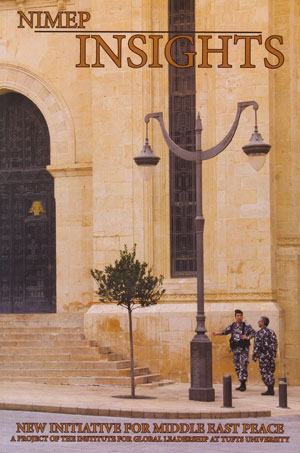NIMEP INSIGHTS: Volume III, Fall 2007

|
|
Publications | Posted Sep 15, 2007
Program: New Initiative for Middle East Peace (NIMEP)
Welcome to the third addition of NIMEP Insights. Now entering its fifth year, the New Initiative for Middle East Peace continues to evolve and grow with the changing nature of world events, as well as the needs of its members and the broader community. This journal advances NIMEP’s goal of creating space for dialogue beyond our doorstep, incorporating the work of alumni and current members as well as one exemplary addition from a leader and NIMEP participant from Georgetown University. This issue highlights our latest fact-finding mission to Lebanon as well as individually pursued primary research from Israel, Jordan, and Washington DC. In addition, we proudly welcome the contributions of General David Barno, Ali Jalali, and Rami Khouri, who have honored us this year with their active participation in the growth of dialogue at Tufts University and the further development of NIMEP. We hope that you enjoy this year’s journal and find its contents both accessible and provocative. In our effort to create sustained research and dialogue, we encourage you to bring your own inspirations to this work with further research and engagement. We look forward to your feedback on the content of this year’s publication, opening the community and broadening our continuing conversation.
Foreward: Beyond the Politics of Fear Sherman Teichman, Director, Tufts Institute for Global Leadership
Afghanistan’s Security Dilemmas: An Interview with General David Barno and Professor Ali Jalali Interview by Peter Maher, International Relations ‘07 and Kristen Casazza, English ‘06
Syrian Foreign Policy Toward Iran: A Strategic Relationship or Tactical Convergence? Alex Zerden, International Relations and Middle East Studies ‘07
The Underlying Causes of the Post-1998 Turkish-Syrian Strategic Partnership Selin Kent, International Relations and Middle East Studies ‘07
A Growing Divide: The Effect of the 2006 Summer War on Religion, Politics, and Power in Lebanon and the Middle East Iman Azzi, Georgetown University ‘06
This Land is Mine: Two Views on Israel’s House Demolition Policy in the Negev Desert Scott Weiner, International Relations ‘08
Photographs from the Field: Syria, Israel, and Lebanon (Photo Gallery) Monica Camacho, International Relations and Middle Eastern Studies ‘08; Sarah Arkin, International Relations and Spanish ‘06; Tim Fitzsimons, International Relations ‘10; Nichole Sobecki, Political Science ‘08
Public Diplomacy: War by Other Means Oleg Svet, International Relations ‘08
Jordan’s Entry into the 1967 Arab-Israeli War: A Study in Omnibalancing Zachary Landau, International Relations ‘07
Divergence and Discourse: Negotiations between the Hashemite Regime and the Islamic Opposition Jacki Silberman, International Relations and Middle East Studies ‘08
A Changing State? An Introduction to Lebanon, the US, and the Middle East after the Summer of 2006: An Interview with Rami Khouri Interview by Brian McLoone, Philosophy ‘09
Between Politics and Identity: The History and Future of Education in Lebanon Kelli Harrison, Middle East Studies and Arabic ‘08
Breaking Point: The Future of the Lebanese Armed Forces, their Role in Lebanon, and their Relationship with Hezbollah Nancy Henry, Sociocultural Anthropology and Arabic ‘09
Transitions: Reflections from Lebanon Unaza Khan, International Relations and Arabic ‘07
Acknowledgements The publication of this journal and the growth and development of NIMEP would not have been possible without the generosity, inspiration, and mentorship of many groups and individuals. Special thanks to Tufts President Lawrence S. Bacow, Robert and JoAnn Bendeston, Provost Jamshed Bharucha, Dean James Glaser, Ibrahim Warde, Malik Mufti, and Rudy Jaafar. For dedication, knowledge, and friendship we give our gratitude and warm embrace to Sherman Teichman and Heather Barry, directors of the Tufts Institute for Global Leadership. We would especially like to thank the Merrin Family Foundation, Howard Finkelstein and Rick Wayne, two indispensable members of the Institute’s Executive Board who have honored us with their continued support. Finally, we are exceptionally grateful for the support of our parents, friends, and colleagues, helping us to pursue our dreams and to continually push the boundaries of our own knowledge.

